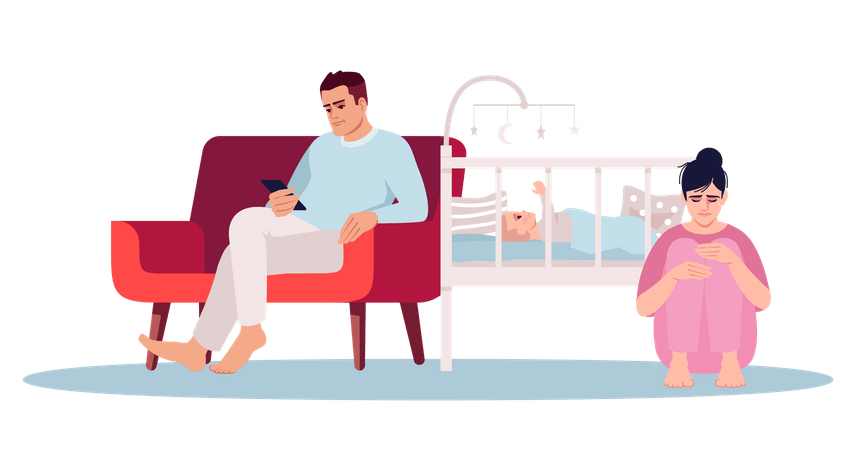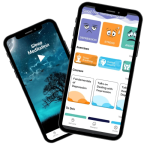Online Postnatal Depression Therapy | Best Therapist for Postnatal Depression Help
- Set up a free & confidential chat on your Postnatal Depression issues
- Unlimited help through Postnatal Depression self-care app
- Live Video or Chat sessions with top Postnatal Depression therapists
Begin Therapy
Consult online with best Therapist
Get the best help for Postnatal Depression
TherapyMantra is here to help you on your path to recovery from Postnatal Depression. We match you with the best Postnatal Depression therapists available 24/7 via video call or messages.
Match with Postnatal DepressionTherapists
We assign the best counselors experienced in Postnatal Depression issues based on your needs.
Affordable and Effective
Our online sessions are 90% less expensive than in-person therapy, available 24/7.
Self-Care for Postnatal Depression
We offer ongoing Postnatal Depression support through self-care tools, help videos, chat groups, meditations, breathing exercises, and other resources.

Wondering if it’s just a phase or something more? Take our Free online Postnatal Depression test to find out?
How it works?
You are matched with a Postnatal Depression counselor based on your needs and preferences. You get a secure “therapy room” where you can communicate with your counselor via chat or phone. You can write or talk about Postnatal Depression & ask questions to deal with Postnatal Depression.

Register for Postnatal Depression Counseling
Simply complete a 5-minute online form to tell us about your Postnatal Depression issues

Consult with your Postnatal Depression Therapist
We connect you with Postnatal Depression counselors who are available 24/7 based on your preferences and needs.

Connect to Our App
Apart from Video/chat sessions, our app offers self-care tools, videos, and meditations to help you deal with your Postnatal Depression.
Best Postnatal Depression Therapists
Positive conversations, exercises, and meditations are used by TherapyMantra psychologists to help you deal with Postnatal Depression. Our Postnatal Depression therapists outperform traditional counseling as you get matched from a pool of 500+ Postnatal Depression counselors, who offer 24/7 unrestricted private chat.








What is Postnatal Depression?
Postnatal depression is a type of depression that can affect women after they have had a baby. It is a common problem, affecting around one in every ten women who give birth.
Symptoms of postnatal depression can include feeling sad, anxious, or overwhelmed, having problems sleeping or losing interest in things you used to enjoy, feeling irritable or angry, and having trouble bonding with your baby.
Postnatal depression can make it difficult to take care of yourself and your baby, and can also lead to problems in relationships. It is important to get help if you are feeling down after giving birth. Treatment for postnatal depression usually includes talking therapies and medication.
Types of Postnatal Depression
Depression can affect a mother’s ability to bond with her baby, and also poses a risk of the baby developing a behavioral problem later in childhood due to lack of interaction with his or her mother. Depression can also lead to poor sleeping patterns for the mother which does not suit the needs of an infant who is already trying to adapt to a new schedule.
There are three main types of postnatal depression:
1) Postpartum blues: This is the most common type of postnatal depression and is characterized by feeling weepy, anxious, and overwhelmed in the first few weeks after giving birth. However, these symptoms usually pass within two weeks.
2) Postnatal anxiety: This is when a woman experiences excessive worry and anxiety about everything related to her baby, such as their health, safety, and whether she is doing a good job as a mother.
3) Postnatal depression: This is the most severe form of postnatal depression and can last for many months or even years. In this case, a woman must be treated by a doctor to ensure that her condition does not further impact herself or her baby.
Treatment Options For Depression
A common treatment option for depression is psychotherapy. But, hypnosis is also being used by some health care professionals as a supplement to, or in place of, traditional psychotherapy.
Cognitive behavior therapy (CBT) is one form of psychotherapy that has been found effective in treating depression. Hypnosis has also been combined with CBT to treat some problems, such as weight loss. There may be other uses for hypnosis in treating depression.
One study looked at how well hypnosis worked as a treatment for depression. The study found that hypnosis helped reduce symptoms of depression. In the study, people were randomly assigned to either a group that received hypnosis or a group that did not receive hypnosis. The people who received hypnosis showed a decrease in their depressive symptoms, while the people who did not receive hypnosis showed an increase in their depressive symptoms.
How can therapy help with postnatal depression?
According to the Mental Health Foundation, up to 1 in 10 women experience postnatal depression (PND) after giving birth. PND is a serious condition that can hurt both the mother and her baby. If left untreated, it can last for months or even years.
Fortunately, there are treatments available that can help most women with PND make a full recovery. One of these treatments is therapy.
Therapy can help by giving the mother a safe place to talk about her thoughts and feelings. It can also help her to understand why she feels the way she does, and to learn new ways to cope with her emotions. In some cases, therapy may also involve medication. If you think you might have postnatal depression, it is important to seek help from a therapist as soon as possible.
If you are a mother struggling with postnatal depression, know that you are not alone. There is help available, and with the right treatment, you can make a full recovery.
Therapy treatments for Postnatal Depression
There are a variety of therapy treatments that can be effective for Postnatal Depression. Some of the most common therapies include:
1) Cognitive Behavioral Therapy (CBT): CBT is a type of therapy that helps you change the way you think about things. It can help manage moods and improve coping skills. CBT can also help you to find new ways of dealing with stressful situations.
2) Interpersonal Therapy (IPT): IPT is a type of psychotherapy that helps those who have been feeling depressed as a result of problems in their relationships. If your relationship with your partner has been difficult, there may be many factors involved. Counseling may help you to identify the problem areas and put an end to them.
3) Psychodynamic Therapy: This therapy helps you understand the underlying causes of your condition. When it is used for PND, psychodynamic therapy can help uncover any unresolved issues which may be causing or triggering symptoms.
4) Group Therapy: Group counseling is also highly effective for postnatal depression. This type of therapy provides a supportive and understanding environment, where participants can share their experiences and feelings with others who are going through the same thing.
5) Mindfulness-Based Cognitive Therapy (MBCT): MBCT is a type of therapy that combines mindfulness practices with cognitive behavioral therapy. The goal is to help you learn to become more aware of your thoughts and feelings and to accept them without judgment. This can help you to manage your moods better.
6) Psychotherapy: This is a type of therapy that involves talking with a therapist about your thoughts and feelings. It can help you to understand why you feel the way you do, and how to cope with your feelings.
7) Art Therapy: Art therapy can be used when all else has failed. It is a type of expressive therapy that uses art, drawing, painting, or sculpture to help you express yourself in positive ways. Studies have shown that using creative activities for therapeutic purposes can lift moods and reduce feelings of stress.
8) Relaxation Techniques: Relaxation techniques can help manage stress and improve moods. Many different techniques can be used, such as deep breathing, visualization, and yoga.
How to find A Postnatal Depression therapist?
TherapyMantra can help you find a Postnatal Depression therapist near you. We have over 500+ therapists listed on our therapist directory. You can follow the following steps to find a good Postnatal Depression therapist:
- First, ask your family doctor or anyone else you are seeing for a referral for a Postnatal Depression therapist.
- The next thing you’ll want to do is ask your friends and loved ones for referrals.
- The next thing you’ll want to do is look online. There are many websites that help people find therapists in their area who can treat things like Postnatal Depression.
10,000+ Happy & Healed patients

“After years of dealing with Postnatal Depression, Therapy Mantra assisted me in releasing a lot of buried emotions. I had previously received Postnatal Depression counseling, which helped, but Therapy Mantra was able to turn me around and make me look forward to a better life.”
Kevin,
1 year on TherapyMantra
FAQs
The terms “postpartum period” and “postnatal period” are frequently used interchangeably but also separately, with “postpartum” referring to issues concerning the mother and “postnatal” referring to those concerning the baby.
Postpartum dysphoria (Baby Blues) is a puerperal disease that affects mothers who have recently given birth; its prevalence ranges from 26 to 85 percent in Western industrialised countries. The baby blues may appear during the first week after birth, last a few days, and then disappear without medical intervention.
The six weeks following childbirth are commonly referred to as the postpartum period. This is a critical period for you and your newborn baby as you adjust to each other and your new family. Many changes will occur in the first few hours and days following childbirth, both physically and emotionally.
Postpartum psychosis is a serious mental health condition that can occur shortly after having a baby. It affects approximately one in every 500 mothers after giving birth. Many women who have given birth will experience mild mood changes after having a baby, which are referred to as the “baby blues.”
Any woman who is pregnant, has recently had a baby, miscarried, recently weaned a child from breast feeding, or adopted a child can suffer from postpartum depression, regardless of how many previous uncomplicated pregnancies and postpartum adjustments she has had.
According to research, your baby feels the same way you do during pregnancy—and with the same intensity. That is, if you cry, your baby feels the same way, as if it were their own. Your baby is preparing for life during the gestational period.


